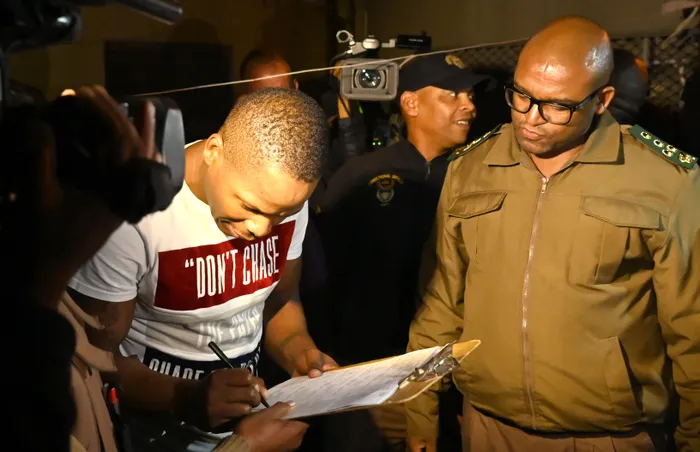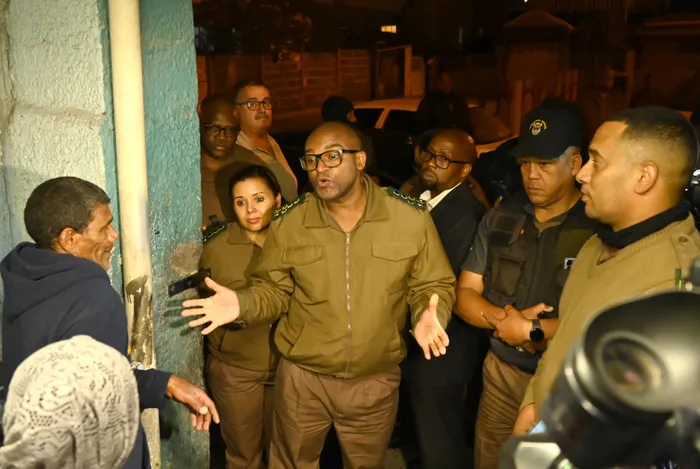Mitchells Plain sees unannounced parole check to combat gender-based violence

National Correctional Services Commissioner Makgothi Thobakgale led a parole monitoring operation at Mitchells Plain. It was focusing on those sentenced for GBV and femicide.
Image: Ayanda Ndamane/ Independent Media
THE Department of Correctional Services (DCS) says unannounced visits to parolees will continue as part of the department's broader efforts to prevent reoffending and protect vulnerable communities.
This after an unannounced monitoring operation in Mitchells Plain on Tuesday found two parolees in breach of their release conditions.
The National Commissioner of DCS, Makgothi Thobakgale, said the operation focused on individuals sentenced for gender-based violence (GBV) and femicide-related crimes.
Thobakgale said the checks were designed to ensure parolees complied with the strict conditions of their release and to reassure the public that offenders were being closely monitored.
“We chose this area because of the high number of rapes that take place here,” he explained.
“So far, we have visited about 13 houses, with four teams on the ground. Our team alone has checked five homes, while the other teams are still conducting visits. We are looking at a caseload of more than 40 parolees.”

National Correctional Services Commissioner Makgothi Thobakgale led a parole monitoring operation at Mitchells Plain. It was focusing on those sentenced for GBV and femicide.
Image: Ayanda Ndamane / Independent Media
The commissioner said two parolees were found outside their homes when the teams arrived, which amounted to a breach of their conditions.
“We explained to them that they should not be outside their yard at this time of night. Of course, one said he went to attend church. But as I’ve explained, you must get permission, and we must know where you are at all times,” he said.
Despite these breaches, Thobakgale said he was encouraged to find all the parolees sober.
“That is important, because many crimes are linked to alcohol and substance abuse. It shows us that at least some conditions are being respected.”
Parole conditions vary depending on the circumstances of the offender, he added.
“Some parolees are not allowed to leave their yard without explicit permission from a parole officer. If they attend church, they must provide a letter from the institution. If they work, they must give us a letter from the employer. The principle is that we need to know their whereabouts at all times. If the conditions change, they need to inform us, and we must approve it,” he explained.
Thobakgale said he was “satisfied, but not entirely” with the evening’s operation.
“These are parolees who have committed crimes that threaten the safety of women and children. It is very, very critical that they comply with their conditions, or else we will revoke their parole and take them back into correctional facilities.”
The commissioner said the DCS conducts both scheduled and unannounced checks, with parole officers tasked with monitoring, home visits, and community service compliance.
“When you are put on parole, you are allocated to a parole officer, who must know where you live and who your family supporters are. Some parolees are required to report to the office, others are intensively monitored at home, depending on their condition,” he said.
Despite the strict supervision, some parolees say they are committed to rehabilitation and reintegration.
“I’m back in the community and I am working with my father,” said parolee Hyron Albertus.
“We are both jack-of-all-trades; we do painting and other kinds of work. I will continue to stick to the conditions of my parole.”
For families, the return of loved ones has made a difference.
Somaya Klaas, whose brother Clive Venter was released on parole in June, said: “Since his release, he has been helping me around the house. My husband passed away, and he has taken over some of his roles at home; he has made my life easier. Our neighbours are very friendly and they even ask him how he is. He has made a huge difference.”
Cape Times
Related Topics: